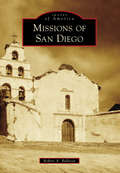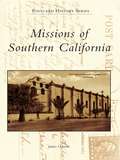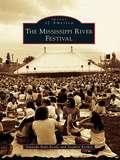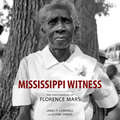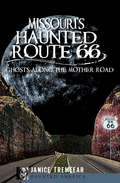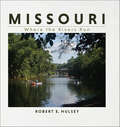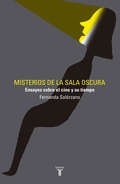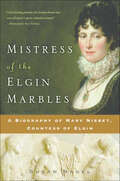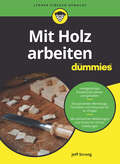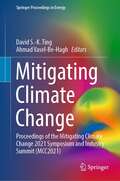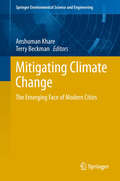- Table View
- List View
Missions of San Diego
by Robert A. BellezzaCalifornia's first settlement began on a trail called El Camino Real, or "The Royal Road," that was traveled by missionary pathfinders, soldiers, and conquistadors on a dramatic journey into a mysterious land. Monterey was discovered in 1603, leading to the quest. Explorers Don Gaspar de Portolá and Juan Bautista de Anza, along with ambitious Franciscan missionaries, founded 21 monumental Spanish missions and several asistencias and chapels for native neophytes, travelers, and visitors to Alta California. Following the initial landing in 1769 at San Diego's seaport, Fr. Junípero Serra founded Mission San Diego de Alcalá, California's first landmark, at the original presidio site. The mission stands today exactly where it was moved, rebuilt, and completed in 1813. The native populations of California witnessed years of change from a sleepy province to the status of US statehood. The Spanish missions forged the powerful underpinnings of the Golden State's earliest settlements 80 years prior to the world's largest migration to California, the 1849 Gold Rush.
Missions of San Francisco Bay
by Robert A. BellezzaLegendary explorer Lt. Col. Juan Bautista de Anza completed a 1,000-mile journey from Sonora, Mexico, crossing the Mojave Desert with the first settlers, to San Francisco's pristine harbor. Fr. Francisco Palóu celebrated the dedication of Mission San Francisco de Asís on June 29, 1776. First established to protect Spain's interests in Alta California from foreign ships, California's landmark buildings are featured here with newly discovered photography depicting a romantic era of colorful Spanish conquistadors, Franciscan padres, and mission Indian neophytes from 1769 to 1823. Explore the heritage of California pioneers' first communities and the 21 California Spanish missions of adobe, stone, and tile that are considered architectural wonders that have captured the imagination of visitors and historians over centuries.
Missions of Southern California
by James OsborneTouring south to north, from San Diego through Santa Barbara County, this unique compendium takes the reader through the Southern California Mission System as portrayed on vintage postcards. The book elaborates on the missions' myriad functions along the coastal El Camino Real through several centuries as not only isolated centers of civilization in thewilderness and altars of Catholic faith, but also as incursions of empire and politics and the means to convert Native American tribespeople to Christianity. While the Missions San Gabriel and San Juan Capistrano fittingly receive ample coverage herein, this book covers the region's nine major missions as well as outlying chapels, or "asistencias."
Mississippi River Festival, The
by Stephen Kerber Amanda Bahr-EvolaIn 1969, Southern Illinois University Edwardsville initiated a remarkable performing arts series called the Mississippi River Festival. Over 12 summer seasons, between 1969 and 1980, the festival presented 353 events showcasing performers in a variety of musical genres, including classical, chamber, vocal, ragtime, blues, folk, bluegrass, barbershop, country, and rock, as well as dance and theater. During those years, more than one million visitors flocked to the spacious Gyo Obata-designed campus in the countryside near St. Louis. The Mississippi River Festival began as a partnership promoting regional cooperation in the realm of the performing arts. Southern Illinois University Edwardsville invited the St. Louis Symphony to establish residence on campus and to offer a summer season. To host the symphony, the university created an outdoor concert venue within a natural amphitheater by installing a large circus tent, a stage and acoustic shell, and a sophisticated sound system. To appeal to the widest possible audience, the university included contemporary popular musicians in the series. The audacity of the undertaking, the charm of the venue, the popularity of the artists, the excellence of the performances, and the nostalgic memory of warm summer evenings have combined to endow the festival with legendary status among those who attended.
Mississippi Witness: The Photographs of Florence Mars
by James T. Campbell Elaine OwensIn June 1964, Neshoba County, Mississippi, provided the setting for one of the most notorious crimes of the civil rights era: the Klan-orchestrated murder of three young voting-rights workers, James Chaney, Michael Schwerner, and Andrew Goodman. Captured on the road between the towns of Philadelphia and Meridian, the three were driven to a remote country crossroads, shot, and buried in an earthen dam, from which their bodies were recovered after a forty-four-day search.The crime transfixed the nation. As federal investigators and an aroused national press corps descended on Neshoba County, white Mississippians closed ranks, dismissing the men’s disappearance as a “hoax” perpetrated by civil rights activists to pave the way for a federal “invasion” of the state. In this climate of furious conformity, only a handful of white Mississippians spoke out. Few did so more openly or courageously than Florence Mars. A fourth-generation Neshoban, Mars braved social ostracism and threats of violence to denounce the murders and decry the climate of fear and intimidation that had overtaken her community. She later recounted her experiences in Witness in Philadelphia, one of the classic memoirs of the civil rights era. Though few remember today, Mars was also a photographer. Shocked by the ferocity of white Mississippians’ reaction to the Supreme Court’s 1954 ruling against racial segregation, she bought a camera, built a homemade darkroom, and began to take pictures, determined to document a racial order she knew was dying. Mississippi Witness features over one hundred of these photographs, most taken in the decade between 1954 and 1964, almost all published here for the first time. While a few depict public events—Mars photographed the 1955 trial of the murderers of Emmett Till—most feature private moments, illuminating the separate and unequal worlds of black and white Mississippians in the final days of Jim Crow.Powerful and evocative, the photographs in Mississippi Witness testify to the abiding dignity of human life even in conditions of cruelty and deprivation, as well as to the singular vision of one of Mississippi’s—and the nation’s—most extraordinary photographers.
Mississippi in the Great Depression (Images of America)
by Richelle PutnamBy the time the Great Depression was well underway, Mississippi was still dealing with the lingering effects of the flood of 1927 and the Mississippi Valley drought of 1930. As Pres. Franklin Roosevelt took office in 1933, Mississippi senator Pat Harrison, chair of the Senate Committee on Finance, oversaw the passage of major New Deal legislation, from which Mississippi reaped many benefits. Other Mississippi politicians like Gov. Mike Connor initiated measures to improve the treatment of inmates at Parchman Prison in the Delta and Gov. Hugh White established the Balancing Agriculture with Industry initiative. Women also played an active role. The Natchez Garden Club successfully spurred tourism by starting the state's first pilgrimage in 1932. Mississippians found employment through the Public Works Administration and the Civilian Conservation Corps, which stimulated economic development through new and add-on construction in urban and rural areas and the construction of nine state parks. For black Mississippians, segregation and discrimination in New Deal benefits and jobs continued, but what they did receive from the federal government spurred a determination to fight for equality in the Jim Crow South.
Mississippi's Natural Heritage: Photographs of Flora and Fauna
by Wesley L. ShoopMississippi's Natural Heritage: Photographs of Flora and Fauna glories in the plants and animals of the state. Featuring four hundred beautiful color photographs and a complete index of included species, Mississippi's Natural Heritage is the first book of its kind dedicated to Mississippi's natural world. Photographer Wesley L. Shoop spent years photographing a vast array of invertebrates, fossils, amphibians and reptiles, birds, mammals, plants, and fungi, and the book features a section dedicated to each group. The photographs in this book were taken in LeFleur's Bluff State Park, a dazzling, well-known Mississippi park and urban natural area that exemplifies the biota of Mississippi. Over a thousand species of flora and fauna have been identified on the park's bluff and floodplain. All of these species can be found in forests, parks, and backyards across the state. LeFleur's Bluff is a fascinating microcosm of Mississippi's ecological community. Shoop has created this breathtaking collection of images in the hope that by illustrating the living diversity found in Mississippi, it can inspire a greater appreciation of what we have and how impoverished we will be if we do not protect it.
Missoula
by Svoboda Collection at the Northern Rockies Heritage Center Stan B. CohenMissoula began in 1860 as Hellgate Village, a trading post located about 4 miles west of what is now downtown. In 1864, the construction of a mill powered by water diverted from Rattlesnake Creek drew residents of Hellgate to the new town, and the arrival of the Northern Pacific Railroad in 1883 assured Missoula's future. The establishment of the University of Montana led to growth on the south side of the Clark Fork River, and the timber industry drove the economy. Missoula has evolved into a trade, medical, educational, and governmental center of western Montana.
Missouri State Penitentiary
by Arnold G. ParksThe Missouri State Penitentiary was established in 1833 via a bill passed by the state legislature, and the first prisoner was incarcerated in 1835. Inmates constructed the main prison building from rock quarried at the site in 1836. The penitentiary closed on September 15, 2004, and plans are in place to redevelop the site into offices for state agencies and private enterprises. The Missouri State Penitentiary was once considered one of the largest maximum-security penal institutions in the United States. After 550 serious assaults occurred inside the prison in the early 1960s, Time magazine called it "the bloodiest 47 acres in America" (although the walls of the penitentiary only contained 37 acres). The penitentiary had the distinction of housing some very famous individuals: boxing champion Sonny Liston learned to box there under the direction of the prison chaplain, infamous gangster Charles Arthur "Pretty Boy" Floyd spent time there, and James Earl Ray was an escapee when he shot and killed Dr. Martin Luther King Jr.
Missouri at War (Postcard History Series)
by Jeremy Paul AmickThe Show-Me State possesses an enduring military heritage that unfolded several decades before it became a state in 1821 and stretches forth to the present day. Missouri has molded many notable military leaders, such as Gen. John J. Pershing, the commander of the American Expeditionary Forces in World War I. It has been the site of a Spanish fort, built in the area that is now downtown St. Louis, and serves as the home of the Liberty Memorial in Kansas City. These people and memorials continue to generate reminders to its citizens of the sacrifices made by the brave men and women who have fought on behalf of the state and nation.
Missouri's Haunted Route 66: Ghosts Along the Mother Road (Haunted America)
by Janice TremeearRide shotgun with the author of Haunted Ozarks on this scary road trip across Missouri&’s stretch of the &“Main Street of America.&” Alongside the nostalgic appeal of Route 66 lurk ghostly roadside hitchhikers, the Goatman of Rolla, amusement park spirits, the Civil War–dead, and the shadows thrown by the mighty Thunderbird. Spanning three hundred dangerously curving miles, the stretch of the Mother Road in Missouri earned the title of &“Bloody 66,&” and some of its stopping places are marked by equally grim history. The Lemp Mansion saw family members commit suicide one by one. Springfield&’s Pythian Castle was an orphanage before becoming a military hospital and housing World War II prisoners of war. Follow Janice Tremeear as she takes a detour down Zombie Road, peers into the matter of the Joplin Spook Light and even stays overnight in Missouri&’s most haunted locations to discover what makes the Show Me State such a lively place for the dead.
Missouri: Where the Rivers Run
by Robert E. HulseyKnown for its scenic rivers, reowned state parks and beautiful vistas, Missouri offers enjoyment for anyone seeking a variety landscapes, natural wonders, charming small towns, and cosmopolitan urban Known for its scenic rivers, renowned state parks and beautiful vistas, Missouri offers enjoyment for anyone seeking a variety of landscapes, natural wonders, charming small towns, and cosmopolitan urban adventures. In Missouri: Where the Rivers Run, follow photographer Robert E. Hulsey on a visual journey across the Show-Me State as he travels from the rolling plains in the northern part of the state to the Ozark Mountains in the south, showcasing the natural heritage along the way. Through these 175 stunning photographs, visit the lush hiking trails at Graham Cave State Park, experience a float trip down the Black River, witness a celebration in Mark Twain's hometown, and get the perfect view of the Cathedral Basilica's painted ceiling. Through the lens of his camera, Robert captures the many wonders of the state and the people who call it home.A beautiful coffee-table book, Missouri: Where the Rivers Run will inspire travelers to explore the splendor and the history of this picturesque Midwest state.
Mister Rogers' Neighborhood: A Visual History
by Melissa Wagner Fred Rogers Productions Tim Lybarger Jenna McGuigganA visual celebration of Mister Rogers’ Neighborhood, America’s most beloved children’s television show, including a foreword by Tom Hanks and a peek at the making of the feature film A Beautiful Day in the Neighborhood, in theaters Thanksgiving weekend. Go behind the scenes of Mister Rogers’ Neighborhood with this unprecedented dive into its storied history. More than fifty years ago, Fred Rogers, a modest television host, revolutionized children’s entertainment with a simple set design, quiet dialogue, and a few hand puppets playing out everyday situations. The effect was extraordinary: Mister Rogers created a relationship with millions of young viewers, each of whom felt as if they were visiting with a trusted friend. His radical kindness, acceptance, and empathy created a sacred place where everyone felt safe and valued. Featuring exclusive photographs; a guide to the characters, puppets, and episodes; original interviews; and rare ephemera, Mister Rogers’ Neighborhood: A Visual History reveals how the show came together to have a deep impact on American culture. Discover wonderful anecdotes from Yo-Yo Ma and Wynton Marsalis as well as the actors, directors, art designers, producers, studio musicians, and more who devoted their careers to working with Fred. Chronicling the show's complete timeline—from its humble beginnings on WQED in Pittsburgh to its commemoration on the big screen in the feature film A Beautiful Day in the Neighborhood, starring Tom Hanks, based on a screenplay written by Micah Fitzerman-Blue and Noah Harpster and directed by Marielle Heller—this incredibly comprehensive book celebrates both Fred Rogers and the wonderful legacy of Mister Rogers’ Neighborhood.
Mister and Lady Day: Billie Holiday and the Dog Who Loved Her
by Vanessa Brantley Newton Amy NoveskyBillie Holiday—also known as Lady Day—had fame, style, a stellar voice, big gardenias in her hair, and lots of dogs. She had a coat-pocket poodle, a beagle, Chihuahuas, a Great Dane, and more, but her favorite was a boxer named Mister. Mister was always there to bolster her courage through good times and bad, even before her legendary appearance at New York’s Carnegie Hall. Newton’s stylish illustrations keep the simply told story focused on the loving bond between Billie Holiday and her treasured boxer. An author’s note deals more directly with the singer’s troubled life, and includes a little-known photo of Mister and Lady Day!
Misterios de la sala oscura: Ensayos sobre el cine y su tiempo
by Fernanda SolórzanoEl cine es a un tiempo la más joven de las artes y la que mayor influencia tiene actualmente sobre la ideología de nuestra sociedad. Ya desde el comienzo del siglo XX, Walter Benjamin reflexionaba sobre lo que supondría la masificación del arte que las nuevas técnicas de reproducción hicieron posible, y proponía que en un futuro -sin duda, el que vivimos hoy- las nuevas técnicas tenderían a la politización y ganarían un poder creciente sobre el destino de los pueblos. El filósofo alemán no vivió lo suficiente para comprobarlo por sí mismo, pero la evidencia de este hecho es patente: el cine no es sólo un reflejo del zeitgeist que lo produce, sino que puede influir él mismo en su momento histórico. Misterios de la sala oscura es una exploración razonada de la relación que tiene el cine con algunos acontecimientos clave en la historia de la humanidad, y específicamente, en la deEstados Unidos. Propone el análisis de diferentes películas, todas ellas caracterizadas por haber marcado un hito en la historia de la gran pantalla. En este libro, Fernanda Solórzano ofrece un análisis pormenorizado del contexto histórico de cada una y reflexiona, con los datos por delante, sobre el papel que tienen en el inconsciente colectivo. Algunas de las cintas que se discuten aquí son: La naranja mecánica, la cual sirve para ejemplificar la historia de la violencia tanto en el cine como en el Londres y las pandillas de Nueva York del siglo XIX; y El último tango en París, que si bien resulta conocida por la controversia que provocó, muy poco se sabe del debate feminista que originó en su época, entre otras.
Mistress of Modernism: The Life of Peggy Guggenheim
by Mary V. DearbornThe life story of the bohemian socialite who rebelled against her famous family and became a renowned art collector. Peggy Guggenheim was the ultimate self-invented woman, a cultural mover and shaker who broke away from her poor-little-rich-girl origins to shape a life for herself as the enfant terrible of the art world. Her visionary Art of This Century gallery in New York, which brought together the European surrealist artists with the American abstract expressionists, was an epoch-shaking &“happening&” at the center of its time. In Mistress of Modernism, Mary V. Dearborn draws upon her unprecedented access to the Guggenheim family, friends, and papers to craft a &“thorough biography . . . [that] will appeal to art lovers interested in more than the paint&” (Publishers Weekly). &“With drive and clarity, Dearborn charts Guggenheim&’s peripatetic life,&” offering rich insight into Peggy&’s traumatic childhood in German-Jewish &“Our Crowd&” New York, her self-education in the ways of art and artists, her caustic battles with other art-collecting Guggenheims, and her legendary sexual appetites (her lovers included Max Ernst, Samuel Beckett, and Marcel Duchamp, to name just a few) (Booklist). Here too is a poignant portrait of Peggy&’s last years as l&’ultima dogaressa—the last (female) doge—in her palazzo in Venice, where her collection still draws thousands of visitors every year. Mistress of Modernism is the first definitive biography of Peggy Guggenheim, whose wit, passion, and provocative legacy Dearborn brings compellingly to life.
Mistress of the Elgin Marbles: A Biography of Mary Nisbet, Countess of Elgin
by Susan Nagel“A lively and welcome account of a charismatic woman,” drawing on the personal correspondence of Lady Mary Bruce, wife of the Earl of Elgin (People).The remarkable Mary Nisbet was the Countess of Elgin in Romantic-era Scotland and the wife of the seventh Earl of Elgin. When Mary accompanied her husband to diplomatic duty in Turkey, she changed history. She helped bring the smallpox vaccine to the Middle East, struck a seemingly impossible deal with Napoleon, and arranged the removal of famous marbles from the Parthenon. But all of her accomplishments would be overshadowed, however, by her scandalous divorce. Drawing from Mary’s own letters, scholar Susan Nagel tells Mary’s enthralling, inspiring, and suspenseful story in vibrant detail.“Absorbing . . . required reading for anyone interested in cultural history, as well as the art of biography.” —Booklist“A sympathetic and emotionally charged portrait . . . [written] with insight and compassion yet without sentimentality.” —Publishers Weekly“A unique life related with animation, admiration, and affection.” —Kirkus Reviews
Mists of Regret: Culture and Sensibility in Classic French Film
by Dudley AndrewJust before World War II, French cinema reached a high point that has been dubbed the style of "poetic realism." Working with unforgettable actors like Jean Gabin and Arletty, directors such as Renoir, Carné, Gremillon, Duvivier, and Chenal routinely captured the prizes for best film at every festival and in every country, and their accomplishments led to general agreement that the French were the first to give maturity to the sound cinema. Here the distinguished film scholar Dudley Andrew examines the motivations and consequences of these remarkable films by looking at the cultural web in which they were made. Beyond giving a rich view of the life and worth of cinema in France, Andrew contributes substantially to our knowledge of how films are dealt with in history. Where earlier studies have treated the masterpieces of this era either in themselves or as part of the vision of their creators, and where certain recent scholars have reacted to this by dissolving the masterpieces back into the system of entertainment that made them possible, Andrew stresses the dialogue of culture and cinema. In his view, the films open questions that take us into the culture, while our understanding of the culture gives energy, direction, and consequence to our reading of the films. The book demonstrates the value of this hermeneutic approach for one set of texts and one period, but it should very much interest film theorists and film historians of all sorts.
Mit Holz arbeiten für Dummies (Für Dummies)
by Jeff StrongFertigen Sie Möbel und andere Dinge aus Holz an! Ob nützlich oder einfach dekorativ ? Ihrer Kreativität sind keine Grenzen gesetzt. Jeff Strong leitet Sie durch den Entstehungsprozess schöner Holzprodukte. Sie erfahren, welche Werkzeuge und Holzarten für die geplante Arbeit geeignet sind und welche Techniken Sie am besten einsetzen. Machen Sie Pläne für ein erfolgreiches Projekt oder legen Sie direkt los: mit den enthaltenen Schritt-für-Schritt-Anleitungen für Bücherregale, Tische, Schränkchen und Kommoden und erschaffen Sie schöne Gegenstände mit Ihren eigenen Händen. Mit diesem Buch erhalten Sie einen schnellen und gut verständlichen Zugang zum Handwerk der Holzbearbeitung.
Mitchell and Trask's Hedwig and the Angry Inch (The Fourth Wall)
by Caridad Svich'… love creates something that was not there before.' – Hedwig John Cameron Mitchell and Stephen Trask’s Hedwig and the Angry Inch opened on Valentine’s Day,1998, in New York City, and ever since, it and its genderqueer heroine have captivated audiences around the world. As the first musical to feature a genderqueer protagonist as its lead, the show has had an extraordinary life on film, Broadway and in the music field. A glam rock musical with a complex relationship to issues related to art, eroticism and matters of identity formation, Hedwig and the Angry Inch is a darkly exuberant fairy tale about a child that discovers she is one of a kind, but also potentially among her own kind, if she dares travel past borders that confine and try to stabilise her being and identity. Caridad Svich examines this exhilarating work through the lenses of visual and vocal rock ’n’ roll performance, the history of the American musical, and its positioning within LGBTIQ+ theatre.
Mitchell's Corn Palace
by Jan CerneyThe world's only Corn Palace began as "The Corn Belt Exposition" in 1892, a promotional enterprise established to showcase the rich agricultural region of the James Valley. The exposition became a popular annual event, and an icon of the American prairie. The Corn Palace has occupied three different buildings since 1892. Adorned each autumn with corn, grains, and native grasses in decorative patterns and themes, the Corn Palace has hosted famous entertainers, politicians, and community events. Now well into its second century and going strong, the Corn Palace has become a symbol of South Dakota. Mitchell's Corn Palace tells the unique story of the palace through a collection of over 200 fascinating vintage images, chronicling this unique piece of Americana.
Mitigating Climate Change: Proceedings of the Mitigating Climate Change 2021 Symposium and Industry Summit (MCC2021) (Springer Proceedings in Energy)
by David S.-K. Ting Ahmad Vasel-Be-HaghThis book includes the proceedings of the Mitigating Climate Change 2021 Symposium and Industry Summit (MCC2021), which brings together research from experts in academia, industry, and policy arenas to uncover the challenges, sharpen existing solutions, and formulate cutting-edge means to mitigate climate change. It highlights the need to create sustainable measures at all fronts including adaptation, policy, finance, renewable energy, solar, wind, thermoelectric, green transportation, and sustainable healthcare. This symposium will disseminate the state-of-the-art breakthroughs and promote collaborations to maximize opportunities for innovative solutions.
Mitigating Climate Change: The Emerging Face of Modern Cities
by Anshuman Khare Terry BeckmanWith ever increasing trends in urban consumption and production practices, a call for action to mitigate Climate Change is often seen as a way to foster sustainable development. Considerable attention is now being paid to determine what urban sustainability would include. Today there is a pressing need to broaden our knowledge and apply new concepts and frameworks to development of modern cities. Building on the foregoing, this book attempts to bring together and discuss concepts, tools, frameworks and best practices to cope with the emerging challenges faced by cities today. The book will be of use to policy makers, city planners, practitioners and academics who are starting to project what modern cities would need to do in terms of energy efficiency, mobility, planning and design of habitat and infrastructure and adapting to climate change.
Mitigation Banking: Theory And Practice
by Douglas R. Porter David Salvesen John De Grove Lindell L. MarshUnder the Clean Water Act, development that results in the permanent destruction of wetlands must, in most cases, be mitigated by the creation of a new wetland or the restoration of a degraded one. In recent years, the concept of "mitigation banking" has emerged. Rather than require developers to create and maintain wetlands on their own on a quid pro quo basis, mitigation banking allows them to pay for wetlands that have been created and maintained properly by others to compensate for their damage.The contributors to this volume provide an overview of mitigation banking experience in the United States, examine the key issues and concerns -- from providing assurances to determining the value of credits -- and describe the practice of developing and operating a mitigation bank. Topics include: history and current experience of mitigation banking policies and concerns of local, state, and federal agencies economics of mitigation banking funding, management, and operation of banks starting a mitigation bank
Mix Your Own Oil Colors: An Artist's Guide To Successful Color Mixing
by Jeremy GaltonColor is the key to a successful painting, and this comprehensive guide to color mixing provides all the information that both beginners and experienced artists will need. In a concise format with easy-to-read charts, this book introduces the basics of color theory and then presents detailed descriptions for mixes of every major color group, complete with full-color examples of finished paintings. It is a reference tool you'll refer to again and again.
